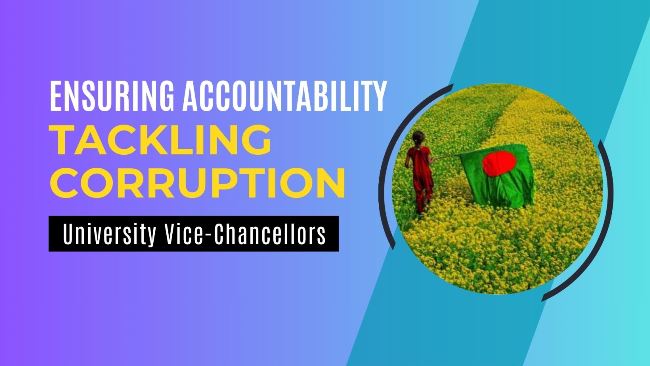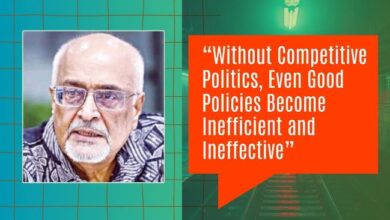Ensuring Accountability: Tackling Corruption among University Vice-Chancellors
Hold University Vice-Chancellors Accountable for Corruption

In Bangladesh, the unfortunate reality of higher education is that universities are often in the spotlight not for advancements in knowledge and science, but for administrative corruption and declining educational standards. The absence of Bangladeshi Universities from Global rankings is as newsworthy as the recurring reports of corruption and irregularities involving university vice-chancellors (VCs). The situation has become so alarming that even the President of the country, who is also the Chancellor of the universities, has openly addressed the issue of VC corruption. Government ministers, too, are increasingly speaking out about the need to improve research and the quality of education in universities.
Don’t Miss Out The Stories:
- Religion Should Be Separated from the Gen Z Generation
- Stop Asian Hate: Combating Discrimination and Promoting Unity
- Protect The Voiceless
- Plan Your Next Holidays in Bangladesh
- Minority Communities Feel Safer Than Before: Survey
Jagannath University Convocation: A Presidential Rebuke
At the recent first convocation of Jagannath University (JnU), President and Chancellor of the universities, Md. Abdul Hamid, stated in his speech, “Vice-chancellors are the chief executives of universities. They must demonstrate honesty, dedication, and competence in their duties. If they themselves condone irregularities or get involved in corruption, imagine what will happen to the university.”
While applauding the President’s remarks, it is crucial to raise the question: Who is responsible for holding VCs accountable for corruption? The authority to appoint VCs and take necessary action against them lies with the Chancellor. The Ministry of Education acts as the secretariat for the universities’ Chancellor (the President) and bears the responsibility of informing the President and the government’s top levels about these issues.
A Report by Daily Desh Rupantor
On Saturday, the newspaper Daily Desh Rupantor published a report titled “VC Shahidur’s Desperation to Appoint Wife, Son, and Daughter”, exposing allegations of corruption and irregularities in recruitment at Khulna Agricultural University (KhA). Prof. Dr. Md. Shahidur Rahman Khan, appointed as VC on September 11, 2018, has been accused of taking bribes of 1.2 to 1.5 million BDT per position for appointments ranging from professors to administrative staff.
Additionally, the VC’s wife applied for a professor’s position, his daughter for a teaching role, and his son for an administrative post. As the head of the recruitment board, Shahidur Rahman Khan’s ethical integrity has been called into question. The Secretary of the University Grants Commission (UGC) told Desh Rupantor that the applications of the acting registrar and the VC’s wife violate ethical principles. The VC should have withdrawn from all recruitment processes due to the conflict of interest.
Current Reality of Public Universities
A review of the current state of public universities reveals that despite allegations of corruption and irregularities in recruitment by VCs, action is rarely taken. When student protests escalate, the most that happens is the removal of the accused VCs or allowing them to resign to defuse the situation. However, the lack of exemplary punishment perpetuates these irregularities and corruption.
Many politically appointed VCs disregard the Ministry of Education, while the UGC, lacking authority, is unable to take effective action against them. The UGC can only investigate and recommend action when directed by the government, and even those investigations are often stifled by the influence of the VCs. For instance, there have been cases where UGC investigation teams were forced to return under pressure from VCs. According to media reports, at least eight VCs were under investigation by the UGC earlier this year, with allegations of corruption and irregularities against several others pending. The situation is so dire that frequent student protests have become the norm across universities.
Protests at Bangabandhu Sheikh Mujibur Rahman Science and Technology University (BSMRSTU), Gopalganj
Amid student protests, the VC of BSMRSTU, Gopalganj, Dr. Khondokar Nasiruddin, was recently forced to resign and leave the campus under the cover of night. Last year, students of Barisal University staged massive protests demanding the resignation of VC SM Imamul Haque, who was subsequently sent on “compulsory leave” to complete his tenure. Similarly, the VC of Chittagong University, Iftekhar Uddin Chowdhury, faced allegations but was allowed to complete his term.
In a rare instance, Begum Rokeya University VC Md. Abdul Jalil Mia, accused of setting records in recruitment irregularities, remains the only VC to serve jail time following a case by the Anti-Corruption Commission (ACC).
The Need for Reforms – Time for Action
In such a grim scenario, it is imperative to reflect on how VCs manage to remain in their positions despite allegations of corruption and misconduct. Is there any alternative to addressing this crisis other than eliminating political favoritism in teacher recruitment, promotions, and appointments to administrative positions?




